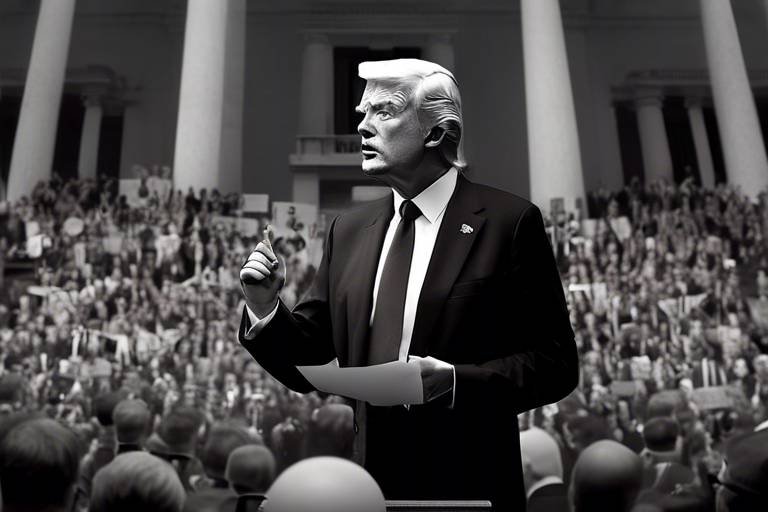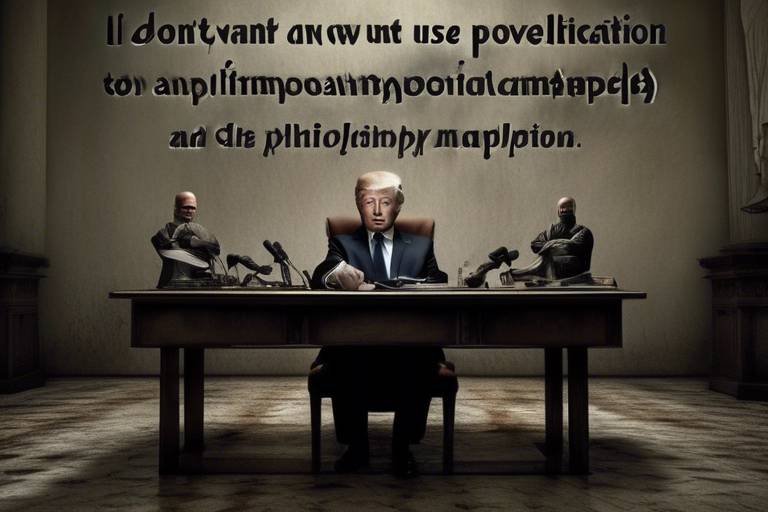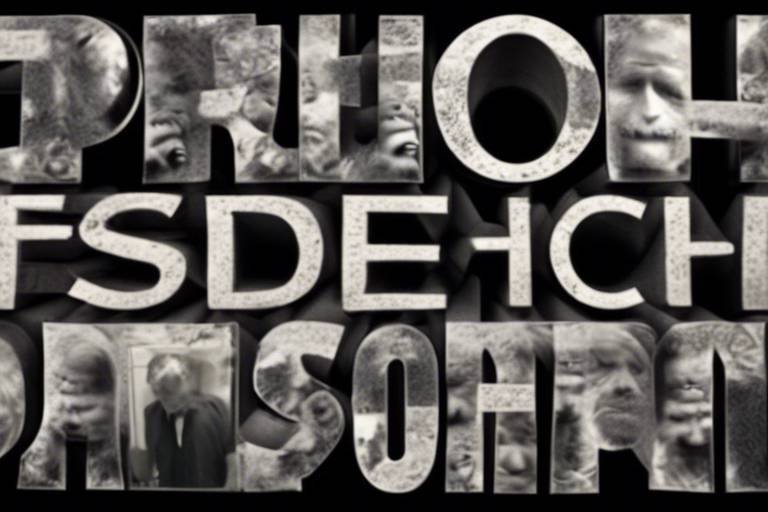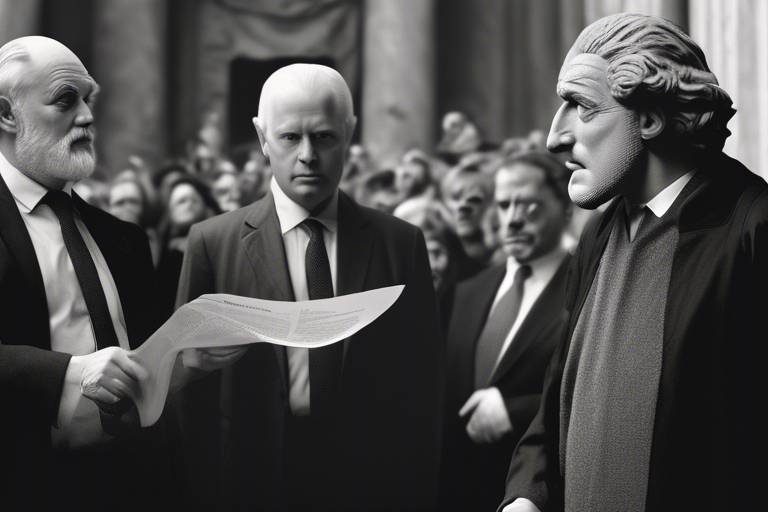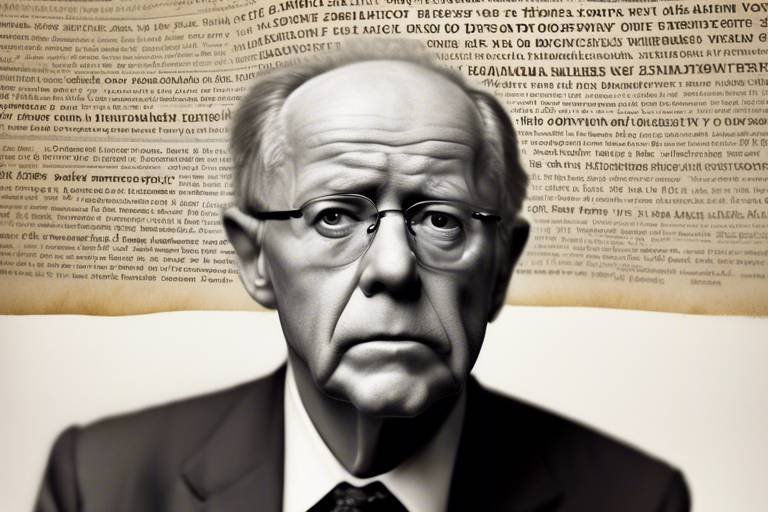Post-truth Politics - A Philosophical Analysis
In today's world, the phrase post-truth politics has become a buzzword, often thrown around in discussions about the state of democracy and public discourse. But what does it really mean? At its core, post-truth politics refers to a political culture where emotional appeal and personal beliefs often take precedence over objective facts. This phenomenon raises critical questions about the nature of truth itself and how it is perceived in the political arena. As we navigate through this complex landscape, we must ask ourselves: How did we arrive at a point where facts seem to matter less than feelings? And what implications does this have for the future of our democratic processes?
The implications of post-truth politics are profound. When political discourse is dominated by subjective beliefs rather than objective truths, it can lead to a fractured society. Citizens become divided not just by their opinions but by their very understanding of reality. This erosion of a shared truth can create a breeding ground for misinformation, where falsehoods spread like wildfire across social media platforms, influencing public opinion and shaping political outcomes in ways that are often detached from reality.
To fully grasp the significance of post-truth politics, we must first understand the philosophical underpinnings that contribute to its rise. The distinction between objective truth—facts that exist independently of human beliefs—and subjective belief, which is shaped by personal experiences and emotions, is crucial. In a political context, when leaders prioritize emotional resonance over factual accuracy, they tap into the deep-seated feelings of their audience. This strategy can be incredibly effective, but it also poses a serious threat to informed decision-making and civic engagement.
As we delve deeper into the nature of truth, we must also consider the role of emotion in politics. Emotional appeals can often overshadow rational argumentation, leading to a landscape where decisions are made not based on evidence but rather on how a message makes people feel. This shift has profound implications for democracy, as it can result in a populace that is swayed more by rhetoric than by reasoned debate.
Philosophically speaking, truth has been a topic of debate for centuries. Some argue that truth is an absolute, while others believe it is subjective and varies from person to person. In the realm of politics, this philosophical discourse becomes particularly relevant. When politicians frame their messages in a way that resonates emotionally with their audience, they often do so at the expense of factual accuracy. This manipulation of truth can create a distorted reality that is accepted by the public as genuine.
In a post-truth era, the emotional weight of political messaging can often eclipse the importance of factual correctness. Politicians and their campaigns harness the power of emotion to connect with voters, using techniques that can sometimes border on manipulation. This emotional appeal is not just a tactic; it is a fundamental shift in how political communication is conducted. As voters, we must be aware of how our emotions can be exploited, leading us to support policies or candidates based on feelings rather than facts.
Rhetoric plays a crucial role in this emotional landscape. The art of persuasion, when wielded effectively, can shape public perception and influence political outcomes. Politicians often employ rhetorical techniques that resonate with their audience's values and beliefs, creating a sense of connection that can overshadow the need for factual accuracy. This manipulation of language can lead to a public discourse that is more about winning hearts than winning minds.
To illustrate the impact of rhetoric on public opinion, we can look at recent political campaigns where emotional appeal was prioritized over factual integrity. For instance, consider how certain candidates framed their narratives during elections, often using emotionally charged language to rally support. These case studies reveal that the line between truth and manipulation can become blurred, raising ethical questions about the responsibilities of those in power.
Social media platforms have revolutionized the way information is disseminated, but they have also contributed to the spread of misinformation. In a post-truth world, these platforms amplify emotional rhetoric, allowing falsehoods to reach vast audiences in mere seconds. The rapid spread of misinformation can lead to a public that is misinformed, creating challenges for democratic processes and informed citizenry.
In light of these challenges, fostering critical thinking skills is more important than ever. An informed citizenry capable of navigating the complexities of post-truth politics is essential for the health of our democracy. By promoting critical thinking, we empower individuals to question the narratives presented to them, seek out factual information, and engage in meaningful discourse.
As we grapple with the implications of post-truth politics, we must also consider the ethical responsibilities of those who disseminate information. Politicians, journalists, and social media platforms all play a role in shaping public understanding, and with that role comes a moral obligation to ensure accuracy and integrity in the information shared with the public.
Journalists have a duty to uphold accountability in their reporting. In a post-truth landscape, the challenges of maintaining this accountability are significant. The pressure to produce sensational stories can lead to the dissemination of misinformation, undermining public trust in the media. It is imperative that journalists adhere to ethical standards and prioritize truth over sensationalism.
As misinformation continues to proliferate, discussions surrounding the regulation of false information have gained traction. Governments and organizations must consider how to combat the spread of misinformation while balancing the fundamental right to free speech. This delicate balance is crucial in preserving democratic principles while ensuring that the public has access to accurate information.
Looking ahead, the implications of post-truth politics for democracy are profound. As misinformation continues to challenge the foundations of democratic processes, societies must find ways to navigate this turbulent landscape. The need for informed citizens, ethical media practices, and responsible political communication has never been more critical. By addressing these challenges, we can work towards a future where democracy thrives on truth and informed discourse.
- What is post-truth politics? - It refers to a political culture where emotional appeal and personal beliefs often take precedence over objective facts.
- How does emotion influence political communication? - Emotional appeals can overshadow rational argumentation, leading to decisions based on feelings rather than facts.
- What role does social media play in post-truth politics? - Social media amplifies emotional rhetoric and facilitates the rapid spread of misinformation.
- What can be done to combat misinformation? - Fostering critical thinking, ensuring accountability in journalism, and considering regulatory frameworks are essential steps.

The Nature of Truth
The concept of truth has been a central theme in philosophical discourse for centuries, yet it remains a complex and often contentious topic. At its core, truth can be understood in two primary ways: objective truth and subjective belief. Objective truth refers to facts that exist independently of individual perceptions or opinions—think of it as the unchanging reality, like the laws of physics. On the other hand, subjective belief is shaped by personal experiences, emotions, and interpretations. This distinction is crucial, especially in the realm of political discourse, where the lines between fact and opinion often blur.
In contemporary politics, the challenge arises when subjective beliefs gain more traction than objective truths. For instance, a politician might claim that their policies will lead to economic prosperity, appealing to the emotions and hopes of their constituents. Yet, the actual economic data may tell a different story. This disconnect highlights a significant issue: how do we navigate a political landscape where emotional resonance often trumps factual accuracy?
Furthermore, the philosophical inquiry into truth raises important questions about the nature of knowledge itself. How do we know what we know? Is it through empirical evidence, or is it influenced by our cultural context and personal biases? These questions become even more pertinent in a post-truth era, where misinformation can spread like wildfire, leaving many to question the very foundation of their beliefs. To illustrate this, consider the following table that summarizes the differences between objective truth and subjective belief:
| Aspect | Objective Truth | Subjective Belief |
|---|---|---|
| Definition | Facts that exist independently of perception | Personal interpretations shaped by experience |
| Examples | The Earth orbits the Sun | Belief in a specific political ideology |
| Verification | Can be tested and proven | Varies from person to person |
As we delve deeper into the implications of these definitions, it becomes evident that the rise of post-truth politics challenges our understanding of truth itself. The ability to discern fact from fiction is not merely an academic exercise; it is a vital skill that underpins our democratic processes. In a world where misinformation is rampant, the responsibility falls on each of us to cultivate a discerning mindset, one that values critical thinking and seeks out objective truths amidst the noise.
Ultimately, the nature of truth in political discourse is not just a philosophical debate; it impacts our daily lives, shaping public opinion and influencing the decisions that affect us all. As we navigate this complex landscape, we must remain vigilant, questioning the narratives presented to us and striving for a deeper understanding of what truth really means in our society.

The Role of Emotion in Politics
In today’s political landscape, it seems that emotions often overshadow rational discourse. Have you ever noticed how a powerful speech can send chills down your spine, while a data-heavy presentation leaves you yawning? This is no coincidence. Emotions play a pivotal role in shaping political narratives and influencing public opinion. In a world where facts can be twisted and manipulated, it’s the emotional appeal that often resonates most with voters. Think of it as a well-crafted movie trailer; it’s not just about the plot, but how it makes you feel. And in politics, those feelings can drive decisions.
We live in a post-truth era, where emotional resonance can sometimes outweigh factual accuracy. Politicians and their campaigns are acutely aware of this dynamic. They leverage emotional triggers to connect with voters on a personal level. For instance, consider how a candidate might evoke feelings of fear, hope, or nostalgia to rally support. By tapping into these emotions, they create a bond that is often stronger than any logical argument. This emotional engagement can be likened to a powerful magnet, drawing people in and making them more receptive to the message being conveyed.
Moreover, the rise of social media has only intensified this phenomenon. Platforms like Twitter and Facebook allow for rapid dissemination of emotionally charged content. A single post can go viral, reaching millions in a matter of hours, often leaving facts in the dust. This environment fosters a culture where sensationalism reigns supreme. As users scroll through their feeds, they are bombarded with images and messages designed to provoke strong emotional reactions. It’s a digital landscape where likes and shares often take precedence over truth.
To illustrate this point, let’s take a closer look at the types of emotions commonly exploited in political rhetoric:
- Fear: Often used to rally support for policies or candidates, fear can create a sense of urgency that compels individuals to act.
- Hope: Candidates often paint an optimistic picture of the future, appealing to voters’ desires for change and progress.
- Nostalgia: By invoking memories of a “better time,” politicians can create a longing for the past, influencing voter sentiment.
This emotional manipulation raises important questions about the integrity of political communication. When emotions override facts, how can voters make informed decisions? It’s as if we’re navigating a maze where the exit is obscured by a haze of feelings. Critical thinking becomes essential in this context. Voters must learn to dissect emotional appeals and differentiate between genuine concerns and manipulative tactics.
In summary, the role of emotion in politics is both powerful and pervasive. As we continue to grapple with the complexities of a post-truth world, it’s crucial to recognize how emotional engagement shapes our political landscape. Understanding these dynamics can empower us as citizens, enabling us to navigate the turbulent waters of political discourse with a more discerning eye.
- Why do emotions play such a significant role in politics? Emotions resonate on a personal level, making it easier for individuals to connect with political messages and candidates.
- How can voters protect themselves from emotional manipulation? By developing critical thinking skills and being aware of emotional triggers, voters can make more informed decisions.
- What impact does social media have on political emotions? Social media amplifies emotional content, allowing it to spread rapidly and often overshadow factual information.

Rhetoric and Persuasion
In the realm of politics, rhetoric serves as a powerful tool that can sway opinions, shape narratives, and ultimately influence the course of democratic processes. But what exactly is rhetoric? At its core, rhetoric is the art of persuasion, a skill that politicians and communicators have honed over centuries. Whether it's through a passionate speech, a cleverly crafted advertisement, or even a social media post, the way information is presented can be just as important—if not more so—than the information itself. In a world inundated with facts and figures, the ability to connect emotionally with an audience is often what makes the difference between a compelling message and one that falls flat.
One of the key elements of effective rhetoric is the use of emotional appeal. Politicians often tap into the feelings of their audience, whether it's hope, fear, anger, or pride. This emotional connection can create a sense of urgency or a call to action, compelling individuals to align themselves with a particular viewpoint. For example, consider a campaign speech that evokes the struggles of working-class families. By sharing personal stories and painting vivid pictures of hardship, the speaker can elicit empathy and rally support for policies that address economic inequality. This is where the line between fact and feeling blurs, as emotional resonance often takes precedence over factual accuracy.
Moreover, the language used in political discourse is carefully chosen to manipulate perceptions. Rhetorical devices such as metaphors, analogies, and hyperbole can transform mundane policies into grand narratives. For instance, describing a tax reform as a "path to prosperity" rather than a "budget adjustment" can shift public perception dramatically. This is not just semantics; it's a strategic choice that can lead to widespread acceptance or rejection of an idea based on how it is framed. The implications are profound, as voters may support policies that resonate emotionally, even if those policies are based on misleading information.
To illustrate the power of rhetoric in action, let’s take a look at a few case studies from recent political campaigns:
| Campaign | Rhetorical Technique | Outcome |
|---|---|---|
| 2016 U.S. Presidential Election | Fear-based messaging about immigration | Mobilized a significant voter base |
| Brexit Referendum | Patriotic appeals to sovereignty | Led to a narrow victory for leaving the EU |
As we navigate through this post-truth era, it’s essential to recognize the implications of rhetoric on public discourse. The emotional undercurrents and persuasive techniques employed can lead to a populace that is less critical and more susceptible to misinformation. This is particularly concerning in a democratic society, where informed decision-making is crucial. The challenge lies in fostering an environment where critical thinking thrives, allowing citizens to discern between persuasive rhetoric and factual information.
In conclusion, rhetoric and persuasion are not just tools of communication; they are fundamental to the fabric of political engagement. Understanding how these elements function can empower individuals to become more discerning consumers of information, ultimately strengthening the democratic process. As we continue to grapple with the complexities of post-truth politics, it becomes increasingly important to cultivate a culture of critical analysis and emotional intelligence in our public discourse.
- What is rhetoric? Rhetoric is the art of persuasion, often used in political communication to influence public opinion.
- How does emotional appeal affect political discourse? Emotional appeal can create strong connections with the audience, often leading to decisions based on feelings rather than facts.
- Why is understanding rhetoric important? Understanding rhetoric helps individuals critically analyze political messages and make informed decisions.

Case Studies in Political Rhetoric
To truly grasp the power of political rhetoric, it’s essential to examine real-world examples that illustrate how language can be wielded as a weapon or a shield in the arena of public discourse. One striking case is the 2016 U.S. Presidential election, where candidates employed a variety of rhetorical strategies to connect with voters on an emotional level. For instance, Donald Trump's use of simple, direct language resonated with many Americans who felt disenfranchised by the political establishment. His slogan, "Make America Great Again," not only evoked nostalgia but also tapped into a collective yearning for change, demonstrating how rhetoric can create a shared identity among supporters.
On the other hand, we have Hillary Clinton, who often relied on a more policy-driven approach, peppered with technical jargon. While her intentions were to present a detailed plan for governance, this style sometimes alienated voters who craved a more relatable discourse. This contrast highlights a crucial aspect of political rhetoric: the ability to adapt one’s message to the audience. In a post-truth environment, where emotions often eclipse facts, the effectiveness of rhetoric can hinge on its emotional appeal rather than its factual accuracy.
Another compelling example comes from international politics. The Brexit referendum in the UK showcased how rhetoric could shape public perception and sway opinions. Pro-Brexit campaigners used phrases like "Take Back Control" to evoke feelings of nationalism and sovereignty. This emotional appeal was instrumental in mobilizing voters who felt that their identity was at stake. In stark contrast, the Remain campaign struggled to convey the potential risks of leaving the EU in a manner that resonated emotionally with the public, often relying on statistics and expert opinions. This disparity in rhetorical strategies underscores how emotional resonance can often triumph over rational argumentation in political contexts.
In both cases, we can see that rhetoric is not merely about the words chosen but also about the emotions they evoke. Political figures have mastered the art of persuasion, often prioritizing emotional connection over factual integrity. This manipulation of truth can lead to a distorted reality where misinformation thrives, and public opinion is easily swayed. The implications of such rhetorical strategies are profound, as they can lead to significant shifts in political landscapes and public trust.
In summary, examining these case studies reveals the intricate relationship between rhetoric and political outcomes. As we navigate through the complexities of post-truth politics, it becomes increasingly vital to understand how language can shape perceptions and influence the democratic process. The challenge lies in fostering an informed electorate capable of discerning fact from fiction amidst the emotional appeals that dominate contemporary political discourse.
- What is post-truth politics?
Post-truth politics refers to a political culture where emotional appeal and personal beliefs often overshadow objective facts and truth.
- How does rhetoric influence public opinion?
Rhetoric shapes public opinion by appealing to emotions, often using persuasive language that can manipulate perceptions and sway beliefs.
- Why is critical thinking important in a post-truth world?
Critical thinking equips individuals with the skills necessary to analyze information, differentiate between fact and fiction, and make informed decisions.
- What role does social media play in post-truth politics?
Social media amplifies emotional rhetoric and misinformation, making it easier for misleading information to spread rapidly among users.

The Impact of Social Media
In today's digital age, social media has become a powerful force that shapes public opinion and influences political discourse. It's like a double-edged sword; on one side, it offers a platform for free expression and the exchange of ideas, while on the other, it can easily become a breeding ground for misinformation and emotional manipulation. Think of social media as a bustling marketplace where anyone can set up a stall and sell their wares, but not all products are genuine. This chaotic environment raises critical questions about the nature of truth and the responsibility of users to discern fact from fiction.
The sheer volume of information shared on platforms like Facebook, Twitter, and Instagram is staggering. Every minute, thousands of posts, tweets, and videos flood these networks, creating an overwhelming landscape for users. In this cacophony, emotional content often rises to the top, capturing attention and driving engagement. Studies have shown that posts that evoke strong emotions—such as anger, fear, or joy—are more likely to be shared, regardless of their factual accuracy. This phenomenon leads to a cycle where sensationalism trumps substance, leaving rational discourse in the dust.
Moreover, algorithms designed to maximize user engagement can further exacerbate this issue. They prioritize content that resonates with users' existing beliefs, creating echo chambers that reinforce misinformation. The result? A polarized society where individuals are less likely to encounter diverse viewpoints and more likely to cling to their subjective truths. It's as if social media has become a funhouse mirror, reflecting distorted images of reality that only serve to confuse and mislead.
To illustrate the impact of social media on political communication, consider the following table, which highlights key statistics regarding misinformation and emotional engagement:
| Statistic | Source |
|---|---|
| 70% of Americans get their news from social media | Pew Research Center |
| Emotionally charged posts are 6 times more likely to be shared | Harvard Business Review |
| Over 50% of users have encountered misinformation on social media | Oxford Internet Institute |
As we navigate this complex landscape, it becomes increasingly important for users to develop critical thinking skills. We must learn to question the sources of our information and the motivations behind the content we consume. Social media platforms also bear a significant responsibility in this regard. They need to implement better measures to flag misinformation and promote credible sources. In a world where a single tweet can spark a global conversation, the stakes have never been higher.
In conclusion, the impact of social media on political discourse is profound and multifaceted. While it has the potential to democratize information and amplify diverse voices, it also poses significant challenges in combating misinformation and emotional manipulation. As users, we must remain vigilant and proactive in our consumption of information, ensuring that we contribute to a healthier public discourse rather than becoming unwitting participants in the spread of falsehoods.
- What is the role of social media in post-truth politics? Social media plays a crucial role by amplifying emotional rhetoric and allowing misinformation to spread rapidly.
- How can individuals combat misinformation on social media? By developing critical thinking skills, verifying sources, and being cautious about sharing unverified information.
- What responsibilities do social media platforms have? Platforms should actively work to identify and mitigate the spread of misinformation while promoting credible content.

Critical Thinking and Public Discourse
In today's chaotic political landscape, the ability to engage in critical thinking is more essential than ever. It’s like having a compass in a storm; without it, one can easily get lost in the sea of information swirling around us. Critical thinking empowers individuals to analyze arguments, evaluate evidence, and discern the truth amidst the noise. But what does this mean for our public discourse? Well, let's dive into that.
At its core, critical thinking involves questioning assumptions, recognizing biases, and understanding the context of information. In a world where post-truth politics reigns supreme, where emotions often overshadow facts, honing these skills can transform how we engage with political narratives. For instance, when we come across a sensational headline on social media, a critical thinker pauses and asks: "What evidence supports this claim?" or "Who benefits from spreading this information?" This kind of probing is crucial for fostering a more informed citizenry.
Moreover, critical thinking is not just an individual endeavor; it’s a collective responsibility. When we engage in public discourse, we must encourage others to think critically as well. This can be achieved through open discussions, respectful debates, and sharing diverse perspectives. By doing so, we create an environment where ideas can be challenged, and misinformation can be debunked. It's like a garden; with the right care, it can flourish, but without attention, weeds of misinformation can choke out the truth.
To further illustrate the importance of critical thinking in public discourse, consider the following table that outlines the differences between critical thinking and emotional reasoning:
| Aspect | Critical Thinking | Emotional Reasoning |
|---|---|---|
| Basis | Evidence and logic | Feelings and beliefs |
| Outcome | Informed decisions | Biased conclusions |
| Approach | Analytical and objective | Subjective and impulsive |
Incorporating critical thinking into our daily conversations can significantly enhance the quality of public discourse. Imagine if every person approached political discussions with a mindset focused on understanding rather than winning an argument. The dialogue would shift from divisive rhetoric to constructive conversations, paving the way for more effective solutions to societal issues. It’s about creating a culture where questioning and curiosity are celebrated rather than stifled.
However, this journey towards a more rational public discourse is not without challenges. In a world saturated with misinformation, it can be daunting to navigate through the clutter. But here's the silver lining: the more we practice critical thinking, the more adept we become at identifying credible sources and recognizing fallacies. It’s a skill that can be cultivated over time, much like learning to ride a bike; it may be wobbly at first, but with practice, it becomes second nature.
In conclusion, critical thinking is not just a valuable skill; it's a vital tool for anyone who wishes to engage meaningfully in public discourse. By fostering these skills within ourselves and our communities, we can combat the tide of misinformation and empower a more informed electorate. In a sense, critical thinking is the antidote to the poison of post-truth politics, enabling us to reclaim our narratives and ensure that democracy thrives.
- What is critical thinking? Critical thinking is the ability to analyze and evaluate an argument or claim based on evidence and logic rather than emotions or personal beliefs.
- Why is critical thinking important in politics? It allows individuals to discern fact from fiction, fostering informed decision-making and healthier public discourse.
- How can I improve my critical thinking skills? Engage in discussions, read diverse perspectives, question assumptions, and practice analyzing arguments critically.

The Ethics of Information Dissemination
In an age where information flows faster than ever, the ethics of information dissemination has become a hot-button issue. The responsibility lies not only with politicians and journalists but also with social media platforms that act as conduits for information. The question arises: what ethical obligations do these entities have to ensure that the information they share is accurate and truthful? As we navigate this post-truth landscape, it’s crucial to reflect on the moral imperatives that guide our communication practices.
Politicians, for instance, wield immense power in shaping public opinion through their statements and policies. Their duty is to provide information that is not only factual but also transparent. When politicians spread misinformation, they undermine the very foundation of democracy, which relies on an informed electorate. This is where the ethical principle of accountability comes into play. Politicians should be held responsible for the veracity of their claims, as misleading information can lead to significant consequences, affecting everything from public health to national security.
Journalists, on the other hand, are often seen as the gatekeepers of information. Their role is to investigate, report, and provide context to the news. In the current environment, where sensationalism often trumps accuracy, journalists face the challenge of maintaining integrity while competing for audience attention. The ethical obligation of journalists extends beyond merely reporting facts; they must also strive to present information in a way that fosters understanding and critical engagement among the public. This involves not only rigorous fact-checking but also a commitment to presenting diverse perspectives. A failure to do so can result in a fractured society, where echo chambers thrive and misinformation spreads unchecked.
Social media platforms play a pivotal role in the dissemination of information. With billions of users worldwide, these platforms can amplify messages at an unprecedented scale. However, the ethical dilemmas they face are complex. Should they act as arbiters of truth? Or should they prioritize free speech above all else? The regulation of misinformation on these platforms is a contentious issue. On one hand, there is a pressing need to combat the spread of false information. On the other hand, there is a legitimate concern about censorship and the potential for abuse of power.
To navigate these challenges, a collaborative approach is essential. This involves not only holding politicians and journalists accountable but also encouraging social media companies to adopt ethical guidelines that prioritize the dissemination of accurate information. For instance, platforms could implement fact-checking protocols and promote media literacy among users, empowering them to discern credible information from misleading content. In this way, the responsibility of information dissemination becomes a shared endeavor, fostering a culture of accountability and transparency.
Ultimately, the ethics of information dissemination is not just about what is shared but how it is shared. It challenges us to consider the impact of our words and the narratives we construct. As we move forward, it is imperative to cultivate a sense of ethical responsibility in all facets of communication. By doing so, we can work towards a more informed society, capable of navigating the complexities of our modern world.
- What is the role of ethics in information dissemination?
The role of ethics in information dissemination is to ensure that the information shared is accurate, transparent, and responsible, fostering trust and informed decision-making among the public. - How can social media platforms combat misinformation?
Social media platforms can combat misinformation by implementing fact-checking protocols, promoting media literacy, and being transparent about their information-sharing policies. - What responsibilities do journalists have in a post-truth world?
Journalists have the responsibility to report facts accurately, provide context, and present diverse perspectives to help the public understand complex issues. - Why is accountability important in politics?
Accountability in politics is vital because it ensures that politicians are responsible for their statements and actions, which is essential for maintaining a healthy democracy.

Accountability in Journalism
In an age where information flows faster than a river during a spring thaw, the accountability of journalists has become a hot topic. With the rise of post-truth politics, where emotions often eclipse facts, the role of journalism is more critical than ever. Journalists are not just reporters; they are the gatekeepers of truth in a chaotic world. But what does it mean for them to be accountable? And to whom are they accountable?
Accountability in journalism involves a commitment to truthfulness, accuracy, and transparency. It means that journalists must take responsibility for the information they present to the public. This responsibility is not just about reporting facts; it’s about ensuring those facts are contextualized and presented without bias. In a world where misinformation spreads like wildfire, the stakes are high. When journalists fail in their duty, the consequences can be dire, leading to public misperception and even social unrest.
One of the primary challenges that journalists face today is the pressure to produce content quickly. In the race to break news, there’s often a temptation to sacrifice thoroughness for speed. This can lead to the dissemination of inaccurate information, which, in the context of post-truth politics, can be weaponized to manipulate public opinion. To counteract this, many news organizations are adopting stringent editorial standards and fact-checking processes. These measures are essential in maintaining credibility and trust with the audience.
Another aspect of accountability is the role of audience engagement. Journalists must not only report but also engage with the public. This can be achieved through various means, such as social media platforms, where audiences can ask questions and provide feedback. By fostering a two-way dialogue, journalists can better understand the needs and concerns of their audience, thus enhancing their accountability. However, this also opens the door to new challenges, as journalists must navigate the often tumultuous waters of public opinion and the potential for backlash.
Moreover, accountability extends to the ethical obligations of journalists. They must adhere to a code of ethics that emphasizes integrity and fairness. This includes being transparent about their sources and methods. For instance, when a journalist cites a source, it’s crucial to clarify whether that source is primary or secondary, as this distinction can significantly impact the credibility of the information presented. The following table outlines key ethical principles that journalists should uphold:
| Ethical Principle | Description |
|---|---|
| Truthfulness | Commitment to reporting facts accurately and without distortion. |
| Independence | Avoiding conflicts of interest and maintaining impartiality. |
| Accountability | Taking responsibility for the content published and correcting errors promptly. |
| Transparency | Being open about sources and methods used in reporting. |
In conclusion, accountability in journalism is not merely a buzzword; it’s a necessity in the landscape of post-truth politics. Journalists must embrace their role as stewards of truth, ensuring that they report with integrity and engage with their audience meaningfully. The future of democracy hinges on their ability to navigate the complexities of information dissemination while remaining steadfast in their commitment to accountability.
- What is accountability in journalism?
Accountability in journalism refers to the responsibility journalists have to report the truth accurately, transparently, and ethically. - Why is accountability important in the age of misinformation?
In a time when misinformation spreads rapidly, accountability ensures that journalists maintain credibility and trust with their audience. - How can journalists engage with their audience?
Journalists can engage with their audience through social media, allowing for dialogue and feedback on their reporting. - What ethical principles should journalists follow?
Key ethical principles include truthfulness, independence, accountability, and transparency.

Regulation of Misinformation
The regulation of misinformation is a complex and contentious issue that sits at the intersection of freedom of speech and the need for public safety. In an age where information spreads like wildfire through social media, the challenge lies in finding a balance between protecting individuals from falsehoods and upholding the democratic principle of free expression. The rise of post-truth politics has highlighted the urgent need for effective regulatory frameworks that can address the dissemination of misleading information without infringing on civil liberties.
One potential approach to regulating misinformation involves the establishment of fact-checking organizations that can provide reliable assessments of the information being circulated. These organizations can serve as a crucial resource for the public, helping individuals discern fact from fiction. However, the effectiveness of such organizations depends on their credibility and the transparency of their processes. For instance, a table comparing different fact-checking organizations could illustrate their methodologies, areas of focus, and reputations:
| Organization | Methodology | Focus Areas | Reputation |
|---|---|---|---|
| FactCheck.org | Nonpartisan analysis | Political claims | High |
| PolitiFact | Rating system | Political statements | High |
| Snopes | Research and verification | Urban legends, myths | High |
Furthermore, governments can consider implementing regulations that hold social media platforms accountable for the content shared on their sites. This could involve requiring platforms to develop algorithms that detect and flag potentially misleading information, or imposing penalties for failure to act against the spread of falsehoods. However, such measures must be carefully crafted to avoid censorship and ensure that they do not inadvertently suppress legitimate discourse.
Another avenue for regulation is through public education initiatives aimed at enhancing media literacy. By empowering citizens with the skills to critically evaluate the information they encounter, societies can foster a more informed electorate that is less susceptible to manipulation. Schools, community organizations, and governments can collaborate to create programs that teach individuals how to identify credible sources, recognize bias, and engage in constructive dialogue about contentious issues.
Ultimately, the regulation of misinformation requires a multifaceted approach that incorporates both technology and education. While it is essential to protect the public from harmful falsehoods, it is equally important to uphold the values of a democratic society. Striking this balance will not only help restore trust in information but also strengthen the foundations of democracy itself.
- What is misinformation? Misinformation refers to false or misleading information that is spread regardless of intent. It can include anything from rumors and hoaxes to inaccurate news reports.
- How can I identify misinformation? Look for credible sources, check for corroboration from multiple outlets, and be wary of sensational headlines or emotionally charged language.
- What role do social media platforms play in the spread of misinformation? Social media platforms can amplify misinformation due to their vast reach and the speed at which information is shared. They are often criticized for not doing enough to combat false claims.
- Can misinformation be regulated without infringing on free speech? Yes, it is possible to regulate misinformation through accountability measures and public education, but it requires careful consideration to avoid censorship.

The Future of Democracy
The landscape of democracy is shifting dramatically in the age of post-truth politics. As we navigate this complex terrain, we must grapple with the implications of misinformation and emotional rhetoric on democratic processes. The future of democracy hinges on our collective ability to adapt to these changes, ensuring that the core values of informed citizenry and accountability remain intact. But what does this mean for us as individuals and as a society? Are we prepared to face the challenges that lie ahead?
One of the most pressing concerns is the erosion of trust in traditional institutions. With the proliferation of fake news and biased reporting, many citizens find it increasingly difficult to discern fact from fiction. This distrust can lead to apathy, disengagement, and, ultimately, a weakened democracy. To combat this trend, we must foster a culture of critical thinking and media literacy. Education plays a crucial role in equipping individuals with the skills necessary to navigate this post-truth world. Schools and communities should prioritize teaching students how to evaluate sources, recognize bias, and engage in healthy debates.
Furthermore, the role of technology in shaping our political landscape cannot be overlooked. Social media platforms have become the battleground for political discourse, often prioritizing sensationalism over substance. This raises important questions about the responsibility of these platforms in moderating content. Should they act as gatekeepers of information, or does that infringe on free speech? The future of democracy may depend on finding a balance between these two competing interests.
As we look to the future, several potential paths emerge for societies grappling with misinformation and distrust. These include:
- Enhanced Regulatory Frameworks: Governments and organizations could implement regulations aimed at curbing the spread of misinformation while still respecting individual rights.
- Strengthened Journalistic Standards: Media outlets must commit to transparency and accountability in their reporting, ensuring that they prioritize factual accuracy over sensational headlines.
- Community Engagement: Encouraging public discourse and community involvement can help rebuild trust in democratic processes. Initiatives that promote civic engagement and dialogue can empower citizens to take an active role in shaping their political landscape.
Ultimately, the future of democracy will depend on our ability to adapt and innovate in the face of challenges posed by post-truth politics. By fostering critical thinking, enhancing regulatory measures, and promoting community engagement, we can work towards a more informed and resilient democratic society. The question remains: Are we ready to take on this responsibility, or will we let misinformation dictate our political future?
- What is post-truth politics? Post-truth politics refers to a political culture where emotional appeal and personal beliefs often outweigh objective facts in shaping public opinion.
- How does misinformation affect democracy? Misinformation can erode trust in institutions, lead to disengagement from the political process, and create divisions within society.
- What can individuals do to combat misinformation? Individuals can improve their media literacy, engage in critical thinking, and participate in community discussions to promote informed decision-making.
- What role do social media platforms play in post-truth politics? Social media platforms amplify emotional rhetoric and misinformation, making it crucial for them to find a balance between moderating content and protecting free speech.
Frequently Asked Questions
- What is post-truth politics?
Post-truth politics refers to a political culture where emotional appeals and personal beliefs often overshadow objective facts and rational discourse. In this environment, misinformation can thrive, shaping public opinion and influencing decisions based more on feelings than facts.
- How does emotion influence political discourse?
Emotion plays a crucial role in politics by driving people’s reactions and decisions. When political messages evoke strong feelings, they can be more persuasive than logical arguments, leading to a situation where emotional rhetoric dominates discussions and can distort the truth.
- What is the significance of rhetoric in politics?
Rhetoric is the art of persuasion, and in politics, it’s used to craft messages that resonate with audiences. Politicians often employ rhetorical techniques to manipulate perceptions, making their arguments more compelling—even if they stray from factual accuracy.
- Can you provide examples of political rhetoric?
Absolutely! Recent political campaigns have showcased rhetoric that simplifies complex issues into catchy slogans or emotionally charged narratives. For instance, phrases that evoke fear or patriotism can rally support, but they may also obscure the truth behind the policies being proposed.
- What role does social media play in misinformation?
Social media platforms act as amplifiers for emotional rhetoric and misinformation. They enable rapid sharing of content, often without fact-checking, which can spread false narratives widely and quickly, complicating efforts to maintain an informed public.
- How can critical thinking help in a post-truth world?
Critical thinking equips individuals with the skills to analyze and evaluate information critically. By fostering a questioning mindset, citizens can better navigate the complexities of post-truth politics, discerning facts from emotional manipulation and misinformation.
- What ethical responsibilities do journalists have?
Journalists have a moral obligation to report accurately and responsibly. In a post-truth landscape, maintaining accountability in journalism is essential for ensuring that the public receives reliable information and can make informed decisions.
- Are there regulations for combating misinformation?
Yes, some governments and organizations are exploring regulatory frameworks aimed at combating misinformation. However, these measures must carefully balance the need to protect free speech while ensuring that accurate information is disseminated to the public.
- What does the future hold for democracy in a post-truth era?
The future of democracy in a post-truth era is uncertain, but it emphasizes the need for informed citizenry and robust discourse. Societies may need to rethink how they engage with information and prioritize transparency and accountability to rebuild trust in democratic processes.

